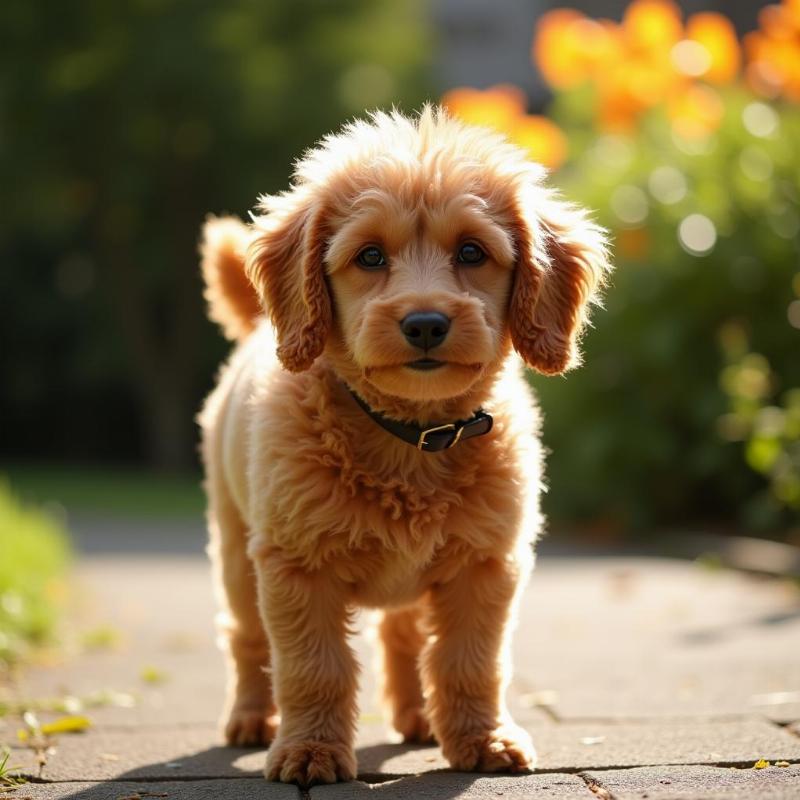Choosing the right dog food for your mini poodle is crucial for their overall health and well-being. A balanced diet tailored to their specific needs ensures they receive the necessary nutrients for a long, happy, and energetic life. This guide will delve into the essential factors to consider when selecting dog food for your miniature companion, ensuring they receive optimal nutrition for every life stage.
Understanding the Nutritional Needs of a Mini Poodle
Mini poodles, despite their small stature, have specific nutritional requirements that must be met for optimal health. Their energetic nature demands a diet rich in protein for muscle development and maintenance. Healthy fats are essential for a glossy coat and healthy skin. Carbohydrates provide energy, and crucial vitamins and minerals support overall bodily functions. Understanding these needs forms the foundation for selecting the right dog food. Are you feeding your poodle the right balance of nutrients?
Key Ingredients to Look for in Mini Poodle Food
High-quality protein sources should be the first ingredient listed on your dog food label. Look for chicken, turkey, lamb, fish, or beef. Avoid generic “meat by-products” as these can be of lower quality. Healthy fats like omega-3 and omega-6 fatty acids are crucial for skin and coat health. These can be sourced from fish oil, flaxseed, or chicken fat. Whole grains, fruits, and vegetables provide essential vitamins, minerals, and fiber. What ingredients does your dog food prioritize?
Life Stage Considerations for Mini Poodle Nutrition
Puppies, adults, and senior mini poodles have varying nutritional needs. Puppies require higher protein and calorie content to support their rapid growth. best dog food for mini poodle can guide you in finding the best puppy food. Adult mini poodles benefit from a balanced diet formulated to maintain their ideal weight and energy levels. Senior poodles may require a lower calorie diet with increased joint support supplements. How do you adjust your poodle’s diet as they age?
Addressing Common Health Concerns with Diet
Mini poodles are prone to certain health issues, such as allergies, tear staining, and digestive sensitivities. Choosing hypoallergenic dog food can help mitigate allergies. Look for limited ingredient diets or those formulated with novel protein sources. best dog food for miniature poodles discusses options tailored to address these specific health concerns. Are you aware of the potential health benefits of a specialized diet for your poodle?
 Mini Poodle with a Healthy, Shiny Coat
Mini Poodle with a Healthy, Shiny Coat
Dry Food vs. Wet Food: Making the Right Choice
Both dry and wet food have their pros and cons. Dry food is generally more cost-effective and convenient for storage. Wet food often has a higher palatability, which can be beneficial for picky eaters. Consider your poodle’s preferences and individual needs when making this decision. Which type of food does your poodle prefer?
Portion Control and Feeding Frequency
Overfeeding can lead to obesity, while underfeeding can result in nutritional deficiencies. Follow the feeding guidelines on the dog food packaging, but adjust portions based on your poodle’s individual activity level and metabolism. What’s the ideal feeding schedule for your poodle?
Consulting Your Veterinarian for Personalized Advice
While this guide provides general recommendations, consulting your veterinarian is crucial for personalized dietary advice. They can assess your mini poodle’s specific health needs and recommend the most appropriate dog food.
Conclusion: Investing in Your Mini Poodle’s Health through Proper Nutrition
Choosing the right dog food for your mini poodle is an investment in their long-term health and happiness. By understanding their specific needs and selecting high-quality food, you can ensure they thrive. Remember that consulting your veterinarian is key to tailoring a diet specifically for your mini poodle’s individual needs. What steps will you take to ensure your mini poodle gets the best possible nutrition?
FAQ
- How much should I feed my mini poodle? Follow the feeding guidelines on your chosen dog food, adjusting according to your poodle’s age, activity level, and metabolism.
- What are the signs of food allergies in mini poodles? Common signs include itching, skin rashes, digestive upset, and ear infections.
- Can I give my mini poodle human food? While some human foods are safe for dogs, many are toxic. Consult your veterinarian before sharing human food with your poodle.
- Is grain-free dog food better for mini poodles? Not necessarily. Some poodles thrive on grain-free diets, while others do not. Consult your veterinarian for guidance.
- How often should I switch my mini poodle’s food? Avoid frequent food changes unless necessary for health reasons. Gradual transitions are important to prevent digestive upset.
- What are the best treats for mini poodles? Look for small, healthy treats that are appropriate for their size. Avoid treats with excessive sugar or artificial ingredients.
- How can I encourage my picky mini poodle to eat? Try adding warm water or low-sodium broth to their dry food, or switch to a more palatable wet food.
Related Articles
- normal glucose level in dogs
- hypoallergenic dogs for sale under 0
- can you use puppy shampoo on adult dogs
Beautdogs.us is your premier resource for all things dog-related in the US. We offer expert advice on dog breeds, care, and products, empowering both new and experienced dog owners to provide the best care for their canine companions. We specialize in providing comprehensive information on dog breeds, grooming, training, nutrition, and health. Connect with our team for personalized guidance at [email protected] or +1 501-555-7529. Beautdogs.us is your trusted partner in navigating the exciting world of dog ownership.